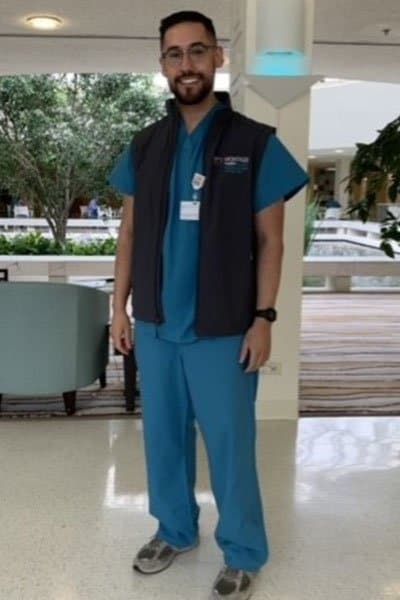A Montage Health Foundation program called Minorities in Medicine provides underrepresented and low-income aspiring medical professionals in Monterey County with mentorship, financial support, and hands-on clinical experience to assist in the complex process of applying to healthcare programs like medical school.
This investment in the next generation of local medical professionals supports Monterey County community members who have limited resources and exposure to the medical field, empowering them to pursue careers in healthcare that might have otherwise felt unattainable. The program, launched in 2021, also addresses the pressing Monterey County healthcare worker shortage.
“Monterey County communities need more healthcare professionals, and we need them from diverse backgrounds,” says Dr. Juan Magaña, Minorities in Medicine founder and Hospitalist at Community Hospital of the Monterey Peninsula. “For the past 16 years I’ve dedicated my life to the advancement of underrepresented students in the health sciences. It’s the least I could do to pay it forward for the mentors in my life, especially my friends, family, and professors who have supported me on my journey to becoming a doctor.”
Everybody has the potential to be a medical professional. Anybody has the potential to do anything with the right support, guidance, and mentorship.
—Dr. Juan Magaña, Minorities in Medicine founder and Hospitalist at Community Hospital of the Monterey Peninsula
At age 13, Magaña, the son of Salinas farm workers, cared for his ailing grandfather, sparking his passion to pursue medicine. It took Magaña 15 years to become a doctor, and now he is back in Monterey County caring for the community and inspiring other underrepresented aspiring medical professionals to follow a similar path. “To continue providing high-quality, culturally competent, accessible, and timely care to the people of Monterey County, it’s essential to lift people up in our own communities,” Magaña says.
Navigating a complex process
Getting into high-level healthcare programs is difficult, and a lack of resources or guidance for people in marginalized communities makes it even harder, leaving much of the skill and potential in those communities untapped.
“I had the academic skills to take the classes, but I had no direction,” says Michael Parr, a Minorities in Medicine student. “Dr. Magaña guided me through medical school prerequisites and offered advice on the most efficient ways to complete them. Having his experience at my disposal throughout this complex journey made all the difference.”
Parr, a Salinas native and veteran who was inspired to become a doctor after receiving care from medics in the military, just applied to medical schools with Magaña’s guidance. He received feedback on applications, advice on which schools to apply to, and most importantly, clinical shadowing experience required for entrance into medical school.
 Fernando Flores Leon, Minorities in Medicine Foundation Scholar
Fernando Flores Leon, Minorities in Medicine Foundation Scholar
Clinical shadowing opportunities can be hard to find, expensive, and competitive, and for those who live in disadvantaged communities, a lack of these opportunities can stifle medical school ambition. Minorities in Medicine provides mentorships with clinical experts including hospitalists, surgeons, and primary care physicians, fulfilling critical shadowing requirements for participants. More than 40 Minorities in Medicine students will have completed a combined 3,900 hours of shadowing by the end of the current cohort in 2024.
Thanks to support from Montage Health Foundation, the program is free for participants. The foundation also provides access to local networking opportunities, medical conferences, scrubs and uniforms, staff support, stipends, and scholarships, making expensive medical career paths more accessible.
The program is part of Montage Health Foundation’s Volunteer Services corps, which consists of more than 500 volunteers supporting initiatives throughout Montage Health. The foundation’s Volunteer Services Manager, Kelly Lepai, works in coordination with Magaña to operate the program and ensure each student receives the support they need to succeed.
"We want these students to gain experience and guidance so they know a career in healthcare is possible,” Lepai says. “Dr. Magaña’s commitment to this program is never-ending, and his work to identify talent in our own communities also addresses our area’s healthcare worker shortage.”
Promoting local longevity
Brenda Torresillas, another program participant, was raised by a single mother who worked in the Salinas Valley fields. She seldom saw doctors in her community that looked like her, leading Torresillas to believe she couldn’t become a medical professional. “Minorities in Medicine inspires people from communities like East Salinas to not only graduate from college and get a graduate degree,” she says, “but also go to medical school, become a doctor or nurse, and return to care for the communities that nurtured their growth.”
“Everybody has the potential to be a medical professional,” Magaña says. “Anybody has the potential to do anything with the right support, guidance, and mentorship.”
The Minorities in Medicine program is a 10-month commitment, running from July 1 to May 1 of the following calendar year. Participants must be able to shadow a physician for at least 12 hours each month during the program. To be eligible for the program, students must meet one of the following criteria:
To learn more or apply for the next cohort, contact Montage Health Foundation Volunteer Coordinator, Vicky Walsh, at vicky.walsh@montagehealth.org.